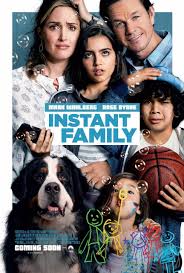Sometimes family comes in unexpected packages, and Instant Family takes this truth to heart in a touching yet hilarious way. Directed by Sean Anders, the film stars Mark Wahlberg and Rose Byrne as a couple who suddenly find themselves adopting three siblings, navigating the rocky and heartwarming journey of parenthood. Set in modern-day America, the story unfolds in suburban settings, blending elements of family drama with comedy, offering a fresh take on the foster care and adoption process.
The plot revolves around Pete (Mark) and Ellie (Rose), a couple who decide to foster children and quickly find themselves adopting not just one, but three kids – a teenage girl and her two younger siblings. What starts as a somewhat naïve idea of helping children turns into a reality check for the couple as they realize how challenging, unpredictable, and emotional parenting can be. The film moves from moments of chaos to heartwarming scenes as Pete and Ellie learn what it truly means to be a family. The challenges of handling rebellious Lizzy, the oldest child, while simultaneously caring for her younger brother and sister, create both comedic and tender moments throughout the film.
The acting in this film is particularly notable. Mark’s performance as Pete is charismatic and believable, as he transitions from a clueless soon-to-be father to a man who understands the depth of family responsibility. Rose’s portrayal of Ellie is warm and relatable, effortlessly balancing the humor and emotional weight that the role demands. Isabela Moner, who plays Lizzy, shines as the emotionally guarded teenager, bringing layers of vulnerability and strength to her role. The supporting cast, including Tig Notaro and Octavia Spencer as the social workers, add much-needed comic relief, yet also emphasize the seriousness of the adoption process. The chemistry between the actors is authentic, making the familial bonds more convincing.
One of the standout aspects of the movie is its direction by Sean Anders. Known for his work in comedy, Anders brings his signature blend of humor and heart to Instant Family, handling sensitive topics with a light, deft touch. The pacing of the film is spot-on, never lingering too long on any one moment but allowing enough time to develop the emotional arcs of each character. While the film tackles some heavy themes like child abandonment, trauma, and the complexity of the foster care system, Anders ensures that the story never becomes too overwhelming. Instead, he strikes a balance, keeping the tone uplifting without minimizing the real struggles involved.
The cinematography and set design contribute to the intimate feel of the movie. The camera work brings the audience into the home of Pete and Ellie, allowing viewers to feel like part of the family’s chaotic but lovable world. The visuals are clean and straightforward, placing emphasis on the performances rather than elaborate camera techniques or special effects. This works well in a story like this, where the focus is on relationships and personal growth. The suburban setting, with its neatly kept houses and yards, contrasts the emotional turbulence happening inside Pete and Ellie’s home, emphasizing the messiness of family life in an otherwise picture-perfect world.
Music is another strong element of the film. The soundtrack, filled with feel-good tunes and emotional ballads, complements the various moods of the movie. Whether it’s during a fun-filled montage of the family bonding or in more introspective moments, the music enhances the scenes without overpowering them. A particularly memorable moment is when Lizzy bonds with her siblings and Pete and Ellie over music, showcasing how art can connect people beyond words.
Another essential theme in the movie is how it breaks down the stereotypes of foster children and foster parents. Rather than portraying the foster kids as troubled or “damaged goods,” the movie focuses on their individual struggles and humanity. The same goes for Pete and Ellie, who are depicted as regular people trying to do something good, only to realize how unprepared they are. Instant Family shows the highs and lows of adoption, from the frustrating bureaucratic red tape to the genuine joy of watching a child feel secure for the first time.
In terms of flaws, the movie does occasionally lean into predictability. Some of the emotional beats, like the inevitable conflict between Pete and Ellie or the climax involving Lizzy, feel formulaic, almost as though they’re pulled from the family film playbook. However, this predictability is somewhat forgivable, given that the movie’s heart and humor more than make up for these minor issues.
Overall, Instant Family is a delightful mix of humor, emotion, and family dynamics that feels authentic and sincere. It’s a film that both entertains and educates about the realities of adoption, without ever feeling preachy. With excellent performances from the cast, sharp direction, and a solid script, it strikes the right balance between laughter and tears. Recommended for anyone who enjoys family comedies with a heart or is interested in stories about adoption and foster care, this movie will leave you with a warm, hopeful feeling.







